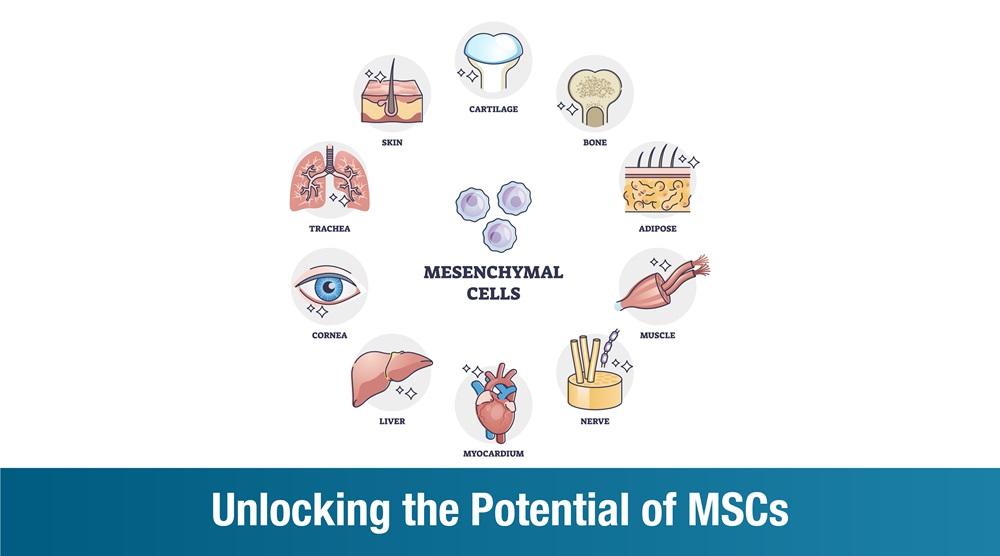
A New Era in Regenerative Medicine
Mesenchymal Cells (MSCs) are revolutionizing how we think about healing and recovery. Let’s dive into the fascinating role of MSCs in regenerative medicine and explore their incredible potential in various therapeutic applications.
What are Mesenchymal Cells?
MSCs are a type of adult stem cell found in various tissues, including bone marrow, fat, and umbilical cord tissue. They’re known for their incredible potential to transform into different cell types, like bone, cartilage, and fat cells. This power of differentiation makes MSCs superstars in the field of regenerative medicine.
MSCs and Tissue Repair: How Do They Work?
Think of MSCs as the body’s natural repair crew. When there’s damage—whether it’s to your knee, heart, or nervous system—MSCs can step in to help heal and restore function.
Here’s how MSCs contribute to tissue repair:
- Differentiation: MSCs can turn into various specialized cell types needed to repair damaged tissues. For instance, if you have a cartilage injury, MSCs can differentiate into cartilage cells to help mend the damage.
- Immunomodulation: MSCs can help modulate the immune system, reducing excessive inflammation that might otherwise damage tissues further.
- Paracrine Effects: MSCs release factors that can influence nearby cells and tissues. These factors can help reduce inflammation, promote cell survival, and stimulate the repair process.
Therapeutic Applications of MSCs
From treating orthopedic conditions to cardiovascular diseases and neurological disorders, MSCs are at the forefront of innovative treatments. Let’s explore some of the most exciting applications.
MSCs in Orthopedic Conditions
Knee osteoarthritis and degenerative joint disease can be debilitating, causing pain and reducing mobility. MSC therapy offers a promising solution. By injecting MSCs into the affected joint, researchers and clinicians aim to regenerate damaged cartilage and reduce inflammation. Studies have shown that MSCs can improve pain and function in patients with knee osteoarthritis, providing a glimmer of hope for those struggling with joint issues.
MSCs in Cardiovascular Diseases
MSCs have shown incredible potential in treating cardiovascular diseases. By injecting MSCs into damaged heart tissue, scientists hope to stimulate repair, reduce scar formation, and improve heart function. MSCs can also help repair blood vessels and support the regeneration of cardiac tissues, offering new avenues for treating conditions like heart attacks and chronic heart failure.
MSCs in Neurological Applications
For neurological applications, MSCs can help repair damaged neurons, reduce inflammation, and promote recovery in conditions like stroke, multiple sclerosis, and Parkinson’s disease. The potential for MSCs to aid in neurological recovery is an exciting development in regenerative medicine.
MSCs in Autoimmune and Inflammatory Diseases
Conditions like rheumatoid arthritis and lupus involve the immune system attacking the body’s own tissues. MSCs can help modulate the immune response, reduce inflammation, and potentially slow down the progression of these diseases. By balancing the immune system and promoting healing, MSCs offer a beacon of hope for those living with these challenging conditions.
The Future of MSC Therapy
Plexus utilizes cutting-edge mesenchymal Cell therapy to address a variety of neurological and orthopedic conditions. By harnessing the regenerative capabilities of MSCs, Plexus aims to offer innovative treatments for ailments such as stroke, multiple sclerosis, Parkinson’s disease, knee osteoarthritis, and degenerative joint diseases.
For neurological conditions, Plexus leverages MSCs to potentially repair damaged neurons, reduce inflammation, and support recovery. The therapy targets improvement in cognitive and motor functions, providing hope for patients with challenging neurological disorders.
In orthopedics, Plexus applies MSCs to rejuvenate damaged cartilage and reduce pain in conditions like osteoarthritis. The therapy involves injecting MSCs into affected joints to promote healing, alleviate discomfort, and enhance mobility, aiming for long-term relief and improved quality of life.
Rather than relying solely on medication or surgery, MSC therapy aims to stimulate the body’s own repair mechanisms, potentially leading to more sustainable and effective treatments. If you’re dealing with a condition that MSC therapy might help with, it’s definitely worth exploring this groundbreaking treatment option.
Reach out to Team Plexus to know more.
WhatsApp +91 89048 42087
Call +91 78159 64668 (Hyderabad) | +91 82299 99888 (Bangalore)
FAQs
What are mesenchymal Cells?
MSCs are adult Cells found in tissues like bone marrow, fat, and umbilical cord. They have the ability to differentiate into various cell types, including bone, cartilage, and fat, making them crucial for tissue repair and regeneration.
What are the implications of mesenchymal Cells in Regenerative Medicine?
MSCs offer groundbreaking potential in regenerative medicine by aiding tissue repair, reducing inflammation, and modulating immune responses. Their versatility allows for innovative treatments in orthopedics, cardiovascular diseases, neurological disorders, and autoimmune conditions, potentially transforming approaches to healing and recovery.
What is the difference between Cell therapy and regenerative medicine?
Cell therapy specifically uses Cells to treat or cure diseases by regenerating damaged tissues. Regenerative medicine encompasses a broader field, including Cell therapy, as well as other techniques like tissue engineering and gene therapy to restore or replace damaged tissues and organs.
What is the success rate of regenerative medicine?
The success rate of regenerative medicine varies by treatment and condition. Generally, early results are promising, with many therapies showing positive outcomes in clinical trials. However, success rates can depend on factors like the specific condition, treatment protocol, and patient response.
What are the three types of regenerative medicine?
The three types of regenerative medicine, each aimed at restoring or enhancing bodily functions through different innovative approaches, are:
- Cell-based therapies (including Cell therapy)
- Tissue engineering (creating or regenerating tissues and organs)
- Gene therapy (modifying genes to treat or prevent diseases)










